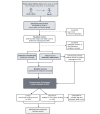Remote Lifestyle Intervention to Reduce Postpartum Weight Retention: Protocol for a Community-Engaged Hybrid Type I Effectiveness-Implementation Randomized Controlled Trial
- PMID: 39773922
- PMCID: PMC11751656
- DOI: 10.2196/62847
Remote Lifestyle Intervention to Reduce Postpartum Weight Retention: Protocol for a Community-Engaged Hybrid Type I Effectiveness-Implementation Randomized Controlled Trial
Abstract
Background: Maternal obesity is associated with significant racial disparities. People who identify as non-Hispanic Black and Latinx are at the highest risk related adverse short- and long-term health outcomes (eg, hypertension in pregnancy and postpartum weight retention). Remote lifestyle interventions delivered during and after pregnancy hold promise for supporting healthy weight outcomes; however, few are tested in groups of people who self-identify as non-Hispanic Black and Latinx or address the neighborhood-level and psychosocial factors driving maternal health disparities. Implementing remote lifestyle interventions within community-based programs that serve birthing people may optimize trust and engagement, promote scalability and sustainability, and have the broadest public health impact.
Objective: The goal of this trial is to test the effectiveness of a culturally adapted remote lifestyle intervention (Healthy for Two-Home Visiting) implemented within home visiting compared to usual home visiting services on postpartum weight retention among pregnant or postpartum individuals, in particular those who identify as non-Hispanic Black and Latinx. Facilitators and barriers to implementation of the intervention within home visiting will be examined.
Methods: We describe the rationale and protocol for this hybrid type I effectiveness-implementation randomized controlled trial. In this paper, we highlight the community-engaged approach and trial design features that enable the implementation of the intervention within home visiting and demonstrate its applicability to the target population. Participants will be 360 pregnant individuals with overweight or obesity enrolled between 20 and 33 weeks of gestation and randomized 1:1 to Healthy for Two-Home Visiting or usual home visiting services. The primary outcome is weight retention at 6 months post partum, calculated as 6-month postpartum weight minus earliest pregnancy weight (≤18 wk of gestation). The measures of implementation include intervention feasibility, acceptability, reach, adoption, and fidelity. Throughout the paper, we highlight the community input used to improve intervention effectiveness and study implementation and as a strategy to promote maternal health equity.
Results: This study was funded in June 2021, and recruitment began in April 2023. As of November 2024, we enrolled 90 participants. Data collection to assess the intervention's effectiveness is expected to end in June 2026. Implementation evaluation is expected to conclude in December 2026.
Conclusions: This hybrid type I effectiveness-implementation randomized controlled trial integrates a culturally adapted remote lifestyle intervention into early home visiting services to examine its effectiveness on postpartum weight retention compared to usual home visiting. We anticipate that the study results will enable an understanding of the drivers of successful implementation within a community-based setting to maximize the future sustainability and dissemination of a strategy for reducing long-term obesity and other maternal health disparities.
Trial registration: Clinicaltrials.gov NCT05619705; https://clinicaltrials.gov/study/NCT05619705.
International registered report identifier (irrid): DERR1-10.2196/62847.
Keywords: community-engaged research; health disparities; home visiting; implementation science; mHealth app; maternal health; mobile health; obesity; postpartum weight retention; pregnancy; remote lifestyle intervention.
©Lindsay M Martin, Christine D McKinney, Lia Escobar Acosta, Janelle W Coughlin, Noelene K Jeffers, Alexandra Solano-Umaña, Kathryn A Carson, Nae-Yuh Wang, Wendy L Bennett, Kelly M Bower. Originally published in JMIR Research Protocols (https://www.researchprotocols.org), 07.01.2025.
Conflict of interest statement
Conflicts of Interest: None declared.
Figures




References
-
- Driscoll AK, Gregory EC. Increases in prepregnancy obesity: United States, 2016-2019. NCHS Data Brief. 2020 Nov;(392):1–8. - PubMed
-
- Hales CM, Carroll MD, Fryar CD, Ogden CL. Prevalence of obesity among adults and youth: United States, 2015-2016. NCHS Data Brief. 2017 Oct;(288):1–8. http://www.cdc.gov/nchs/data/databriefs/db288.pdf - PubMed
-
- Alemán JO, Almandoz JP, Frias JP, Galindo RJ. Obesity among Latinx people in the United States: a review. Obesity (Silver Spring) 2023 Feb;31(2):329–37. doi: 10.1002/oby.23638. https://europepmc.org/abstract/MED/36695058 - DOI - PMC - PubMed
-
- Flegal KM, Kruszon-Moran D, Carroll MD, Fryar CD, Ogden CL. Trends in obesity among adults in the United States, 2005 to 2014. JAMA. 2016 Jun 07;315(21):2284–91. doi: 10.1001/jama.2016.6458. https://europepmc.org/abstract/MED/27272580 2526639 - DOI - PMC - PubMed
Publication types
MeSH terms
Associated data
LinkOut - more resources
Full Text Sources
Medical
Research Materials
Miscellaneous

